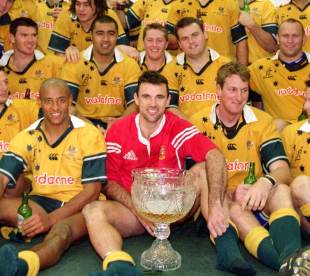|
Super Rugby comment
Rugby is missing a trick on Anzac day
Greg Growden
April 24, 2013

The victorious Wallabies of 2001 pose with the Tom Richards Cup - named after the war veteran who played for both Australia and the British and Irish Lions
© Getty Images
Enlarge
Those in charge of rugby union carry on about how they are masters of marketing and know exactly what the punters want. Well then why does AFL and the NRL keep beating them at the simplest ideas, and working them to their advantage? A case in point - Anzac Day. For years, the AFL and NRL have made a big deal about Anzac Day, and understandably so. Both have ensured they've scheduled major matches for that day, and used the occasion to honour those who served. On the day, Essendon and Collingwood plus St Kilda and the Sydney Swans, playing in New Zealand, will be running around in the AFL, while the NRL boasts the Roosters v Dragons and Melbourne Storm against New Zealand Warriors. As for rugby union - which boasts a tournament that has far greater Australian-New Zealand interaction than the other two winter football codes - all but nothing is scheduled. There is club football, with Randwick and Eastern Suburbs playing an Anzac Day match at Sydney's Coogee Oval, but at SANZAR level the moment has been missed. There are Super Rugby games on Friday, Saturday and Sunday, but none on the actual Anzac Day. SANZAR administrators are bound to carp on that it would be too difficult to schedule, but two matches involving Australian and New Zealand franchises - one played in Australia and the other in New Zealand - would work perfectly on Anzac Day. If there is a problem with scheduling, easy … make certain that the teams involved have the bye the round before or the round after. Surely, that's not impossible and rugby at the highest level would have the vehicle to get strong promotional value out of one of Australia's and New Zealand's most important days. Also it would remind the public of the many great Australian and New Zealand rugby players who either gave their lives during wartime, or served with honour. The Wallabies are deeply interlinked with war. In World War I, there were 10 Australian players that died - Blair Swannell, Ted Larkin, Harold George, Fred Thompson, Arthur Verge, George Pugh, Herbert Jones, Clarence Wallach, Bryan Hughes, William Tasker. Both Swannell and Larkin were killed during the landing of Gallipoli on April 25, 1915. Several other notable players survived the Great War, including Tom Richards after whom the cup played for between the Wallabies and the British and Irish Lions is now named. Richards starred on the first Wallaby tour of Great Britain in 1908-09, and was also part of the Gallipoli landing and went on to win a Military Cross on the Western Front. Richards' teammates - Dan Carroll and Syd Middleton - were also impressive soldiers. Overall rugby players in New South Wales and Queensland volunteered in large numbers. Ninety per cent of senior players enlisted, forcing clubs to be disbanded. The Second World War also had a major impact on Australian Rugby. The 1939 Wallaby tour of United Kingdom had to be called off shortly after the players landed in England due to the declaration of war. Most of the team had to immediately return home, with the sea journey taking four months rather than the usual two because of the zigzagging course the ship had to make to avoid German U-boats. Many high profile rugby players enlisted, including New South Wales five-eighth Cec Ramalli, the son of an Indian camel driver who changed his surname from Ali Ram, who was captured in Malaya. His captain Vay Wilson, joined the British Navy and was awarded the DSC for his actions in the English Channel in a PT boat. Winston 'Blow' Ide whose mother was Australian and father a Japanese silk printer, died when the Japanese POW ship he was on was torpedoed and sunk by an American submarine. Despite repeated calls to clamber onto a raft, Ide kept helping his fellow POWs. His final words were: 'No mate. I'm staying here to help my mates. In any case I can swim to Australia if I have to." Shortly after, he disappeared. He was one of nine Australian representative players who died during the Second World War. Those who survived the war included Stan Bisset, whose brother Butch died in his arms on the Kokoda Track. He won the Military Cross, as did Nicky Barr who became one of the war's most celebrated air aces, bringing down at least 12 enemy planes in the one year. He was shot down three times behind enemy lines and escaped four times, including once from a moving train. The incredible stories of all these great veterans with rugby ties deserve far wider recognition, or at least a reminder every 12 months. Scheduling major Super Rugby matches on Anzac Day would go a long way towards achieving that. © ESPN Australia / New Zealand
|
Live Sports
Communication error please reload the page.
-
Football
-
Cricket
-
Rugby
-
- Days
- Hrs
- Mins
- Secs
F1 - Abu Dhabi GP
Abu Dhabi Grand Prix December 11-131. Max Verstappen ()
2. Valtteri Bottas (Mercedes)
3. Lewis Hamilton (Mercedes)
4. Alexander Albon ()
5. Lando Norris ()
6. Carlos Sainz Jr ()
-
ESPNOtherLive >>
Darts - Premier League
Golf - Houston Open
Snooker - China Open
Tennis - Miami Open

